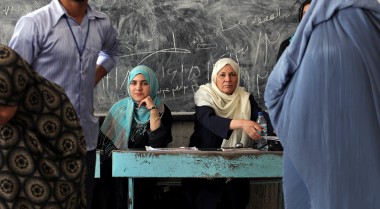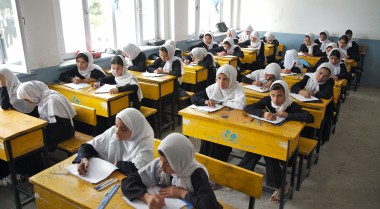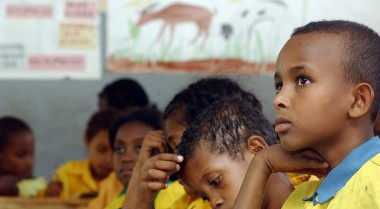
Good Practice Guidance for Implementing Education for Peace, Conflict Resolution and Social Emotional Learning (SEL) at Scale in Education Systems
Join the GPPAC Peace Education Working Group for the 2nd webinar in the series and with a discussion on:
Good Practice Guidance for Implementing Education for Peace, Conflict Resolution and Social Emotional Learning (SEL) at Scale in Education Systems
Good Practices for Curriculum Approaches and Textbook Renewal for Social Emotional Learning, Peace and Gender Sensitivity
(November 11th, 2020, 15:00 Amsterdam time)
FREE! Pre-Registration Required. Please register here.
This webinar includes specific examples from GPPAC Peace Education Working Group Partner Dr. Nina Bagdasarova (American University of Central Asia) in Kyrgyzstan and Andy Smart (NISSEM) in England who are both working with textbook revisions in the field. This session will begin by highlighting the good practices in the UNESCO – IIEP policy booklets, “Safety, Resilience and Social Cohesion: A Guide for Curriculum Developers” (Batton, J., Alama A., Sinclair, M. (2014) http://education4resilience.iiep.unesco.org/en/curriculum with additional resources provided. The webinar is hosted by Jennifer Batton, GPPAC Peace Education Co-Chair and co-author of the policy booklets, along with her co-author Dr. Margaret Sinclair of NISSEM.
Audience: Education leaders and practitioners in the community and/or in government such as Ministry of Education and/or strategic education partners working on developing or enhancing their education policies, curricula and implementation of those policies and resources.
When: 11 November 2020 (15:00 Amsterdam time)
Special Guest Bios:
Nina Bagdasarova is a professor in the Psychology Department at the American University of Central Asia /www.auca.kg / (Bishkek, Kyrgyzstan). Nina has been working on peace education issues since 2001. She was a member of many expert teams developing state documents (like the Concept of Multicultural and Multilingual Education of Kyrgyz Republic) and research papers (like Analysis of Textbooks and Learning/Teaching Materials on Representation of Human Rights, Conflict Management and Peace Building Issues) and teaching manuals (Unity in diversity: the teaching techniques of multicultural education) . Nina also has been working with university education programs in the scope of ethnicity, nation building and conflict resolution. She was a co-director of the three-year project in Excellence of University Teaching Program: “Nationhood and Narratives in Central Asia: History, Context and Critique”.
She trains professionals in diversity management and conflict resolution skills (state and municipal officials, school and university teachers). Nina Bagdasarova is a member of The Experts’ Council on Interethnic Relations under the President of Kyrgyz Republic. As a member of GPPAC Peace education working group, Nina is continuing her work using international networking for the mutual exchange of ideas and methodologies.
Andy Smart is a blogger, interviewer and writer with a specialty in education, textbooks, reading and publishing. He has over 30 years’ experience in education and publishing in the Middle East, Asia, and Africa. After teaching in Sudan and Egypt, Andy Smart worked in educational and children’s publishing in the UK and Egypt. For the past twenty years, he has worked as an education and publishing consultant in English, Arabic and French, specialising in textbook policy and development, educational publishing sector development, primary education, curriculum development, literacy and children’s books development.
He is a co-convener of NISSEM, a practitioner–academic network that seeks to apply social and emotional learning to address SDG Target 4.7 through learning materials, and treasurer of the International Association for Research on Textbooks and Educational Media (IARTEM). He is the co-author of ‘Learning for uncertain futures: the role of textbooks, curriculum, and pedagogy’, a background paper for UNESCO’s Futures of Education initiative – https://unesdoc.unesco.org/ark:/48223/pf0000374078 – and Textbook Policies in Asia: Development, Publishing, Printing, Distribution, and Future Implications: https://www.adb.org/sites/default/files/publication/478946/textbook-policies-asia.pdf, as well as co-editor of NISSEM Global Briefs: Educating for the Social, the Emotional and the Sustainable: https://www.nissem.org/node/269.
Facilitator Bios:
Jennifer Batton, M.A., is the current Co-Chair of the Global Partnership for the Prevention of Armed Conflict, Peace and Conflict Resolution Education (CRE) Working Group (www.gppac.net). She has 23 years of experience in the field of conflict resolution education (CRE) working for UNESCO, state government, higher education, and a non-profit to help local and global communities build their capacity to prevent, address, and manage conflict. She is the former Director of Education Programs for the state government agency, the Ohio Commission on Dispute Resolution and Conflict Management (serving approximately 3600 primary and secondary public schools and 52 teacher training colleges and universities) and provided training, presentations, and consultation for teachers, policy makers, and youth serving professionals in 23 countries.
Dr Margaret Sinclair has worked on education and conflict since 1987, initially for UNHCR’s programme for Afghan refugees in Pakistan. She headed UNHCR’s Refugee Education Unit in Geneva and served as a consultant on education in emergencies with UNESCO and other organisations. She has authored several publications on education in emergencies and on ‘Learning To Live Together’. Margaret Sinclair served as Technical Adviser within the Education Above All Foundation, 2009-2017. She is a founding co-convenor 0f Networking to Integrate SDG 4.7 and SEL into Education Materials (NISSEM).


